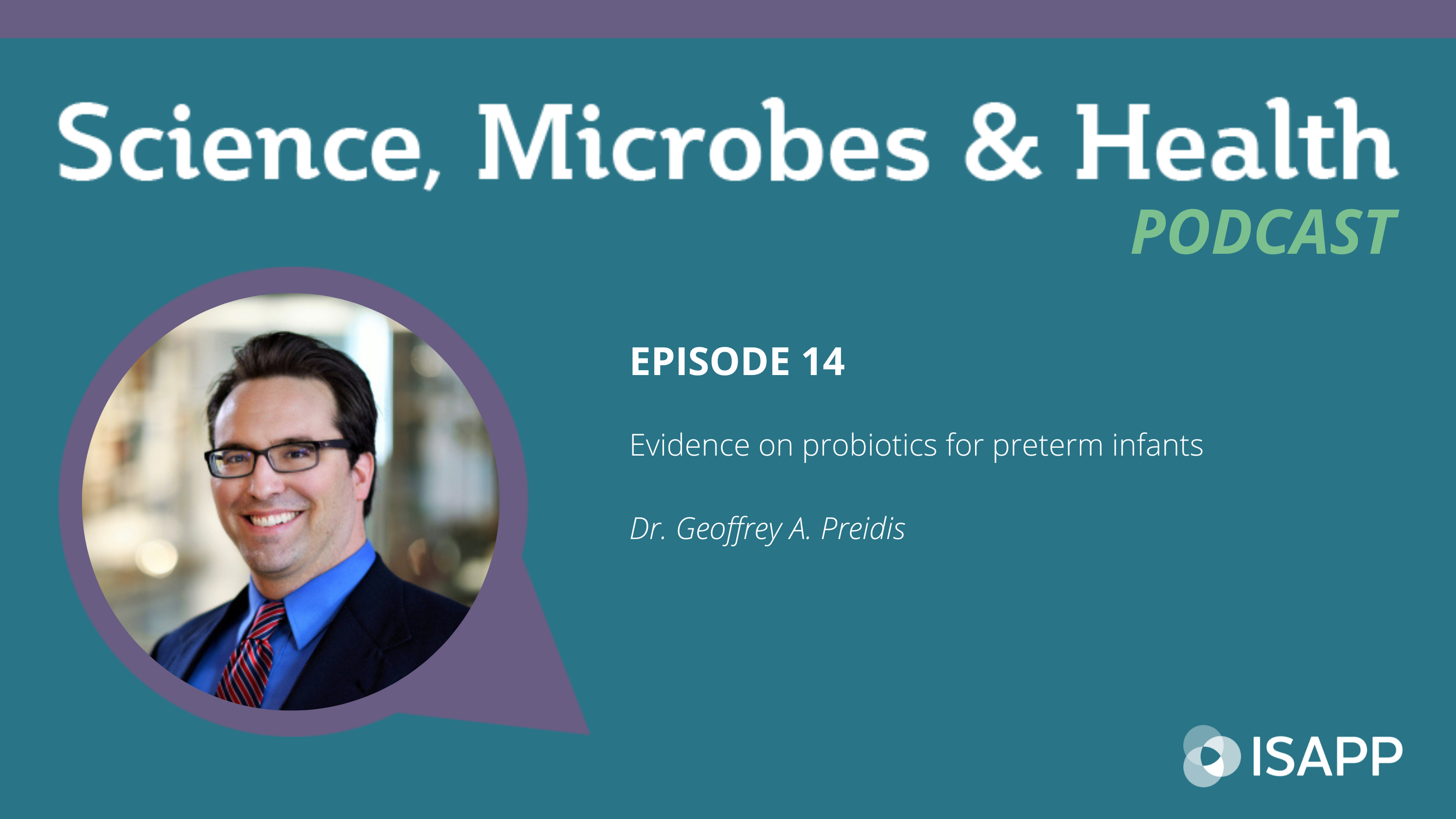Episode 14: Evidence on probiotics for preterm infants
Podcast: Play in new window | Download
Subscribe: Apple Podcasts | Spotify | RSS
The Science, Microbes & Health Podcast
This podcast covers emerging topics and challenges in the science of probiotics, prebiotics, synbiotics, postbiotics and fermented foods. This is the podcast of The International Scientific Association for Probiotics and Prebiotic (ISAPP), a nonprofit scientific organization dedicated to advancing the science of these fields.
Evidence on probiotics for preterm infants, with Dr. Geoffrey A. Preidis
Episode summary:
In this episode, the ISAPP podcast hosts talk about probiotics for preterm infants with Geoff Preidis, MD, PhD, a pediatric gastroenterologist and researcher at Baylor College of Medicine & Texas Children’s Hospital. Predis describes the evidence on probiotics for prevention of necrotizing enterocolitis, the challenges in interpreting the evidence that exists, and using the evidence to make clinical decisions.
Key topics from this episode:
- Dr. Preidis works mostly with preterm infants, a population that didn’t exist just a few decades ago.
- In the totality of evidence on probiotics for treating or preventing certain health conditions, the largest body of evidence is on whether probiotics can prevent negative health outcomes in preterm infants. Large meta-analyses (>15,000 preterm infants, >60 RCTs) conclude that overall, probiotics reduce the risk of necrotizing enterocolitis (NEC) by ~50%.
- Probiotics do not appear to increase the risk of sepsis. In one case, contamination during the manufacturing process led to a severe infection and death. Although there is a very low risk of this happening, it highlights that a pharmaceutical grade probiotic is not available to give infants.
- Many caveats accompany these findings, however. Trials use a wide range of products, as well as different strains, doses, durations of treatment, preterm infant populations, etc. Trials vary in their quality.
- The body of evidence on probiotics for preventing NEC is convincing but far from perfect. Future trials need to continue reporting details on safety.
- Some leading professional societies have issued guidelines that contradict each other.
- How should clinicians make a decision, then? One way of choosing one therapy over another is to use network meta-analysis, which ranks therapies according to which product might have greater efficacy than another. However, the most studied therapies tend to rank higher.
- Another way to make a decision is to consider looking at mechanisms. This is challenging with NEC, since we don’t know exactly what causes it.
- Dr. Preidis is doing research on the association between early life undernutrition and increased risk of metabolic disorders later in life, what is known as the “thrifty phenotype” hypothesis. The mechanism may involve an epigenetic switch, whereby early life nutritional insult affects gene expression and metabolism in a long-lasting way.
Episode abbreviations and links:
This 2020 Cochrane Library review of probiotics for preventing NEC, mortality, and invasive infection (i.e. sepsis), found that “Combined analyses showed that giving very preterm and very low birth weight infants probiotics may reduce the risk of necrotizing enterocolitis, and probably reduces the risk of death and serious infection,” but also noted important concerns about the quality of the trials used to support these conclusions, that, “further, large, high-quality trials are needed to provide evidence of sufficient quality and applicability to inform policy and practice.”
Study in JPGN showing metabolites and fecal microbiota in preterm infants are modulated according to the probiotics they are exposed to.
Network meta-analysis on how probiotics affect morbidity and mortality in preterm infants.
A recent commentary by Dr. Preidis on rational selection of a probiotic for preventing necrotizing enterocolitis
Additional resources:
Probiotics and Necrotizing Enterocolitis. ISAPP infographic.
Probiotics to Prevent Necrotizing Enterocolitis: Moving to Evidence-Based Use. ISAPP blog.
About Dr. Geoff Preidis:
Dr. Preidis received his undergraduate degree in Physics from Harvard University, then completed his medical degree, residency in Pediatrics, fellowship in Pediatric Gastroenterology, Hepatology & Nutrition, and Ph.D. in Translational Biology and Molecular Medicine from Baylor College of Medicine. Now an Assistant Professor at Baylor College of Medicine and Texas Children’s Hospital, Dr. Preidis leads the Nutritional Physiology Research Laboratory and serves as an attending physician on both the Neonatal Gastroenterology, Hepatology & Nutrition Consultation Service and the Transplant Hepatology Service.
Dr. Preidis’s laboratory seeks to define mechanisms through which early life malnutrition impairs intestinal and liver function, leading to both short-term and long-term medical problems. Current studies focus on how malnutrition slows gastrointestinal motility, alters the gut microbiome, and inhibits the liver’s ability to synthesize important substances including bile acids – all of which adversely impact child growth. This research aims to help children suffering from nutritional deficiencies caused by a wide range of medical and socioeconomic factors, including premature newborns in the neonatal intensive care unit.















